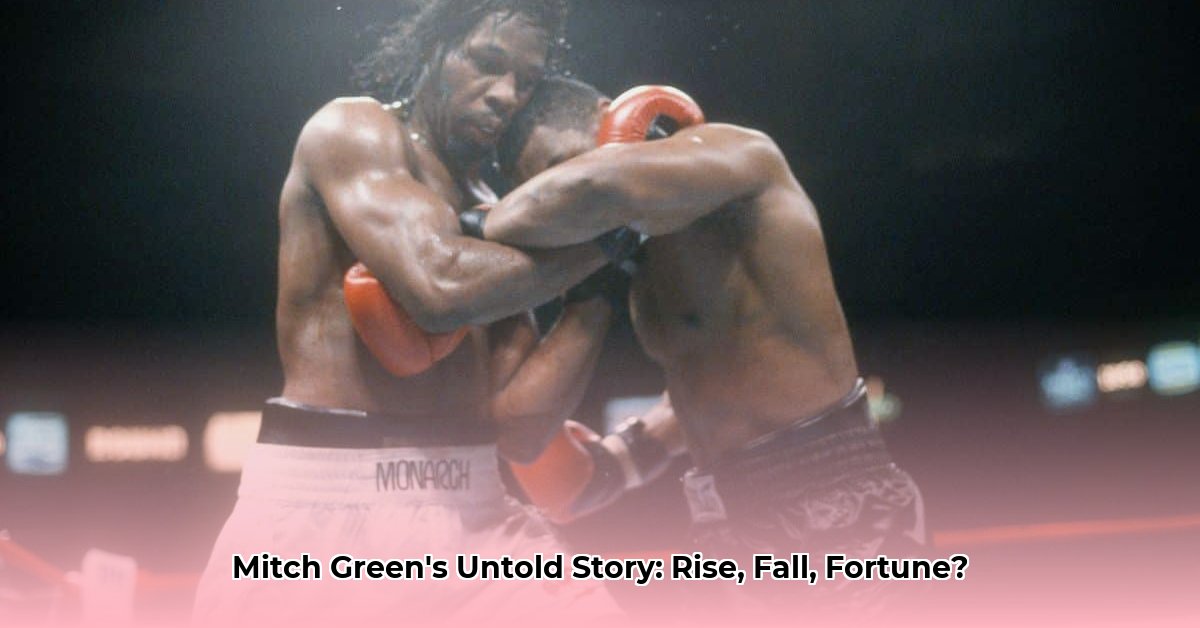
utput must use language in english us. Content:
Mitch "Blood" Green. The name evokes images of explosive boxing matches, particularly his iconic clashes with Mike Tyson. But Green's story isn't solely defined by these legendary (or infamous) bouts. It's a complex narrative interwoven with financial highs and lows, legal battles, and the inherent precariousness of a boxer's life. This isn't a simple "net worth" article; it's a deeper exploration of how his career trajectory, personal challenges, and life choices shaped his financial reality. We delve into the hard truths many boxers face: the fleeting nature of big wins and the formidable difficulties of building lasting wealth within the ring. For comparison, see how another boxer's wealth fared: Mickey Rourke's net worth.
From Amateur Glory to Professional Uncertainties
Mitch Green wasn't born into boxing's elite. His amateur career, however, was undeniably impressive: four New York Golden Gloves championships and an impressive record of 64 wins against only 7 losses. He even climbed to #7 in the WBC rankings. This success hinted at a lucrative professional future, but translating amateur glory into substantial early career earnings proved challenging. Precise figures from his early professional years are scarce, making a definitive assessment difficult. Did his early wins garner significant financial returns? Records from that era offer limited insight.
The Tyson Fights: A Double-Edged Sword of Fortune and Misfortune
The fights against Mike Tyson in 1986 and 1988 stand as pivotal moments, profoundly impacting Green's financial standing. The 1986 bout, where he surprisingly went the distance with the undefeated Tyson, undoubtedly brought a substantial payday—his financial peak. However, the 1988 encounter and subsequent street brawl, while increasing his notoriety, incurred significant legal costs, potentially erasing a large portion of his earnings. A $45,000 damages award, coupled with substantial legal fees, dramatically altered his financial landscape. Did this notoriety ultimately cost him more than it gained him? The answer is crucial to understanding his overall financial trajectory.
A Rocky Road: Inconsistency and Financial Instability
Green's professional career lacked consistency, further complicating his financial situation. Flashes of brilliance were interspersed with periods of inactivity, hindering his income. Disputes over pay, a sadly common occurrence in boxing, exacerbated his financial struggles, resulting in lost opportunities and further reducing his earnings. Legal battles further strained his resources and created a cycle of instability. The cumulative effect of these factors significantly impacted his wealth. How did these factors impact his long-term financial health? The answer requires careful consideration of his career trajectory and legal issues.
Post-Boxing Life and the Elusive Net Worth
Estimating Mitch Green's net worth presents significant challenges. The absence of readily available, transparent financial records, coupled with the inconsistencies of his career and the aftermath of his legal battles, makes any precise figure highly speculative. While some experts suggest a modest net worth, reflecting the typical struggles of retired boxers, others believe his early career earnings and Tyson fight purse might suggest a higher, yet still likely not substantial, figure. Is it possible to reach a conclusive determination? The available evidence makes a definitive answer elusive.
More Than Numbers: A Boxer's Legacy
Mitch Green's story transcends mere financial figures. It's a powerful narrative of talent, setbacks, and missed opportunities – a story that resonates beyond the boxing world. While his precise net worth remains uncertain, his legacy is far richer and more compelling than any financial assessment. His life serves as a significant cautionary tale for aspiring athletes and a stark reminder of the financial precariousness many boxers face outside the ring. What is the lasting impact of his story? It highlights the importance of financial planning and the challenges faced by many athletes in transitioning from their careers.
How Financial Struggles Impacted Mitch Green's Boxing Career
Green’s career serves as a case study in how financial pressures affect athletic performance. His journey highlights the complex interplay between financial stability and athletic success.
Early Career and Financial Expectations
Green's early success created expectations that couldn't be met without a strong financial foundation. While he earned modest sums, they were insufficient to guarantee long-term stability. This created a vulnerability that impacted his later success.
The Tyson Fights and Their Lasting Financial Impact
The Tyson bouts illustrate the double-edged sword of high-stakes fights. The initial payday was significant, yet the legal and financial consequences overshadowed the short-term gains. This instability likely affected his training and focus.
Career Instability and Its Financial Repercussions
The inconsistency of Green's career directly translated into financial instability. The lack of regular income made it difficult to manage his finances effectively.
Post-Retirement Struggles and the Importance of Financial Planning
Green's post-retirement struggles underline the crucial need for athletes to prioritize financial planning. The lack of such planning can lead to prolonged financial difficulties, impacting quality of life and overall well-being.
Key Takeaways:
- Green’s early success created high expectations but lacked a solid financial base.
- The Tyson fights offered short-term financial gains but long-term legal and financial consequences.
- Inconsistent boxing performance translated into income instability.
- Post-retirement financial difficulties highlight the critical importance of proactive financial planning for athletes.
- The lack of clear financial records for Green underscores the challenges in assessing the financial status of many athletes.